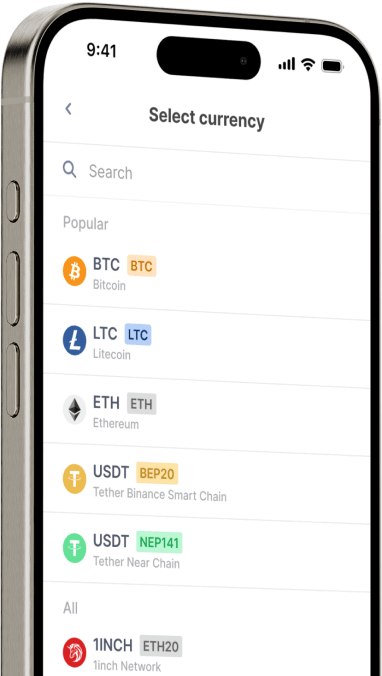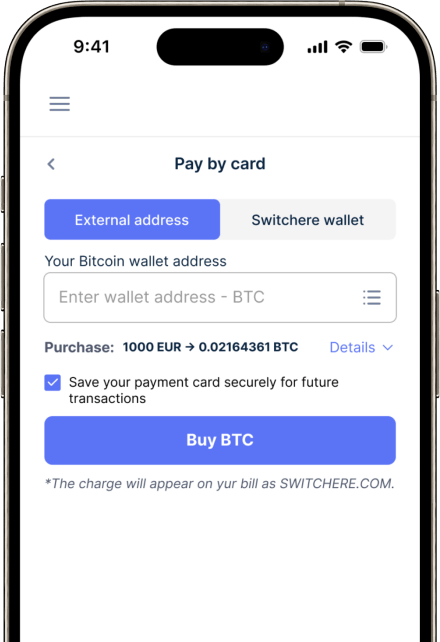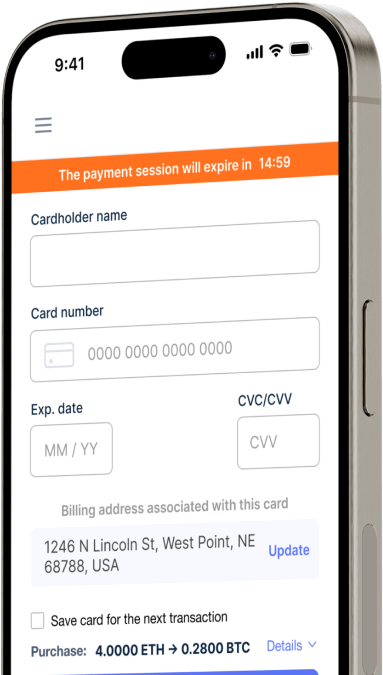Convert
Peruvian Sol (PEN) to Binance USD (BUSD) Instantly
Purchase Binance USD (BUSD) with Peruvian Sol (PEN) easily at Switchere and benefit from fast, secure transactions.
About
Binance USD (BUSD)
BUSD (BUSDBSC) is a regulated, fiat-backed stablecoin pegged 1:1 to the US dollar, designed to provide price stability within the volatile digital asset landscape. Issued by Paxos Trust Company in partnership with Binance, BUSD aims to offer a reliable medium of exchange and store of value. The "BUSDBSC" ticker specifically denotes its presence as a BEP-20 token on the BNB Smart Chain, a high-performance decentralized network facilitating extensive DeFi applications. The core technology behind BUSD relies on transparent, audited US dollar reserves held in dedicated accounts, ensuring each token is backed by an equivalent amount of fiat currency. This contrasts with algorithmic stablecoins, offering a different approach to maintaining its peg and cryptographic security.
The primary utility of BUSD, particularly its BUSDBSC variant, is to enable seamless transactions and participation in the BNB Chain's ecosystem with minimal price risk. Its tokenomics are straightforward: new BUSD is minted when dollars are deposited with Paxos, and burned when redeemed, maintaining the 1:1 backing. Prominent use cases include trading against other cryptocurrencies on exchanges like PancakeSwap, serving as collateral in lending and borrowing protocols, yield farming within various DeFi applications, and facilitating peer-to-peer payments. As an NYDFS-approved (for the Paxos-issued Ethereum version) and widely adopted stablecoin, BUSD plays a significant role in providing liquidity and a trusted, compliant digital dollar representation on various blockchain technology platforms, acting as a foundational element for many Web3 infrastructures and on-chain financial activities.
Buy Other 150+ Cryptocurrencies for Peruvian Sol (PEN)
Other Coins for Peruvian Sol (PEN)
-
PEN to ZRX
-
PEN to 1INCH
-
PEN to AAVE
-
PEN to ACH
-
PEN to ALGO
-
PEN to TLM
-
PEN to ANKR
-
PEN to APE
-
PEN to NFT
-
PEN to API3
-
PEN to APT
-
PEN to ARPA
-
PEN to AUDIO
-
PEN to AVAX
-
PEN to AVAX
-
PEN to AXS
-
PEN to BADGER
-
PEN to BAL
-
PEN to BNT
-
PEN to BAT
-
PEN to BNB
-
PEN to BUSD
-
PEN to BSW
-
PEN to BSV
-
PEN to BLUR
-
PEN to BONE
-
PEN to CTSI
-
PEN to CELR
-
PEN to CELO
-
PEN to CEL
-
PEN to LINK
-
PEN to CHZ
-
PEN to CHR
-
PEN to C98
-
PEN to COMP
-
PEN to CFX
-
PEN to PEOPLE
-
PEN to CVX
-
PEN to ATOM
-
PEN to CTC
-
PEN to CRV
-
PEN to DAI
-
PEN to DASH
-
PEN to MANA
-
PEN to DENT
-
PEN to DGB
-
PEN to LEASH
-
PEN to DYDX
-
PEN to XEC
-
PEN to EOS
-
PEN to ETC
-
PEN to ENS
-
PEN to ETHW
-
PEN to FET
-
PEN to FIL
-
PEN to FLOKI
-
PEN to GALA
-
PEN to GNO
-
PEN to ONE
-
PEN to HBAR
-
PEN to HOT
-
PEN to HOOK
-
PEN to ICX
-
PEN to ILV
-
PEN to IMX
-
PEN to INJ
-
PEN to ICP
-
PEN to IOST
-
PEN to IOTX
-
PEN to JASMY
-
PEN to JST
-
PEN to KAVA
-
PEN to KCS
-
PEN to KSM
-
PEN to KNC
-
PEN to LDO
-
PEN to LQTY
-
PEN to LPT
-
PEN to LOOKS
-
PEN to LRC
-
PEN to LUNA
-
PEN to MKR
-
PEN to MASK
-
PEN to EGLD
-
PEN to ALICE
-
PEN to NEAR
-
PEN to XEM
-
PEN to NEXO
-
PEN to NOT
-
PEN to NMR
-
PEN to OKB
-
PEN to OMG
-
PEN to ONT
-
PEN to EDU
-
PEN to OP
-
PEN to OGN
-
PEN to CAKE
-
PEN to PAXG
-
PEN to PENDLE
-
PEN to DOT
-
PEN to POL
-
PEN to QTUM
-
PEN to QNT
-
PEN to RDNT
-
PEN to XRD
-
PEN to RVN
-
PEN to REN
-
PEN to RSR
-
PEN to RLC
-
PEN to RPL
-
PEN to SFP
-
PEN to SHIB
-
PEN to SKL
-
PEN to SXP
-
PEN to STND
-
PEN to STG
-
PEN to XLM
-
PEN to GMT
-
PEN to STORJ
-
PEN to STMX
-
PEN to SUSHI
-
PEN to SNX
-
PEN to USDT (NEP141)
-
PEN to USDT (FA2)
-
PEN to USDT (TRC20)
-
PEN to USDT (JETTON)
-
PEN to USDT (SPL)
-
PEN to USDT (ERC20)
-
PEN to USDT (AVAC)
-
PEN to USDT (BEP20)
-
PEN to USDT (Polygon)
-
PEN to XTZ
-
PEN to GRT
-
PEN to SAND
-
PEN to TFUEL
-
PEN to THETA
-
PEN to RUNE
-
PEN to TON
-
PEN to TUSD (BEP20)
-
PEN to TUSD (TRC20)
-
PEN to TWT
-
PEN to UOS
-
PEN to UMA
-
PEN to UNI
-
PEN to USDC (SPL)
-
PEN to USDC (Polygon)
-
PEN to USDC (OP)
-
PEN to USDC (TRC20)
-
PEN to USDC (BEP20)
-
PEN to USDC (BEP20)
-
PEN to USDC (AVAC)
-
PEN to USDC (ARB)
-
PEN to USDC (ERC20)
-
PEN to VET
-
PEN to VRA
-
PEN to WAXP
-
PEN to WOO
-
PEN to WLD
-
PEN to WBTC
-
PEN to WMINIMA
-
PEN to XDC
-
PEN to YFI
-
PEN to YGG
-
PEN to ZIL
How to Buy Binance USD (BUSD)
Frequently Asked Questions
-
What does the PEN/BUSD trading pair represent in the digital asset market?
The PEN/BUSD pair represents a direct fiat on-ramp, allowing users to convert Peruvian Sol (PEN) into Binance USD (BUSD). BUSD is a stablecoin designed to maintain a 1:1 value peg with the U.S. Dollar, historically issued by Paxos. This pair serves as a bridge for Peruvian users to enter the cryptocurrency ecosystem, providing a stable digital asset to hedge against volatility before trading for other cryptocurrencies.
-
Are there critical regulatory updates concerning BUSD I should know before trading from PEN?
Yes, this is crucial. In early 2023, the New York Department of Financial Services (NYDFS) ordered Paxos, the issuer of BUSD, to cease minting new tokens. Consequently, major exchanges like Binance are phasing out support for BUSD trading pairs. Before converting PEN to BUSD, users must understand that BUSD's liquidity and utility are declining, and consider alternative stablecoins like USDT or USDC for long-term stability.
-
What was the primary utility of BUSD after acquiring it with PEN?
Historically, after acquiring BUSD, its primary utility was to serve as a stable store of value on-chain. It was widely used for trading against other digital assets on numerous exchanges, participating in decentralized finance (DeFi) protocols for lending or yield farming, and for fast, low-cost payments on blockchains like the BNB Smart Chain (as a BEP-20 token). However, due to its phasing out, this utility is rapidly diminishing.
-
What is the process for purchasing BUSD using Peruvian Sol (PEN)?
To purchase BUSD with PEN, you typically need to use a cryptocurrency exchange that supports this specific fiat gateway. The process involves creating an account, completing KYC/AML compliance checks, and then depositing PEN via supported local payment methods like a Peruvian bank transfer. Once the fiat deposit is confirmed, you can execute a buy order for BUSD on the platform's order book.
-
What kind of fees are involved when converting PEN to BUSD?
Converting Peruvian Sol to BUSD typically involves several potential fees. These can include a deposit fee for your PEN transaction from a bank, a trading fee on the cryptocurrency exchange (often a percentage of the transaction value), and a network fee if you decide to withdraw the BUSD to an external digital wallet. The BUSD withdrawal fee depends on whether you use the BEP-20 or ERC-20 blockchain standard.
-
What security measures are essential when performing a PEN to BUSD conversion?
When converting fiat like PEN to any digital asset, including BUSD, security is paramount. Always use a reputable cryptocurrency exchange with a strong security track record. Enable two-factor authentication (2FA) on your account. Be vigilant against phishing scams attempting to steal your login credentials. For holding significant amounts, consider transferring your BUSD from the exchange to a secure, non-custodial digital wallet where you control the private keys.




